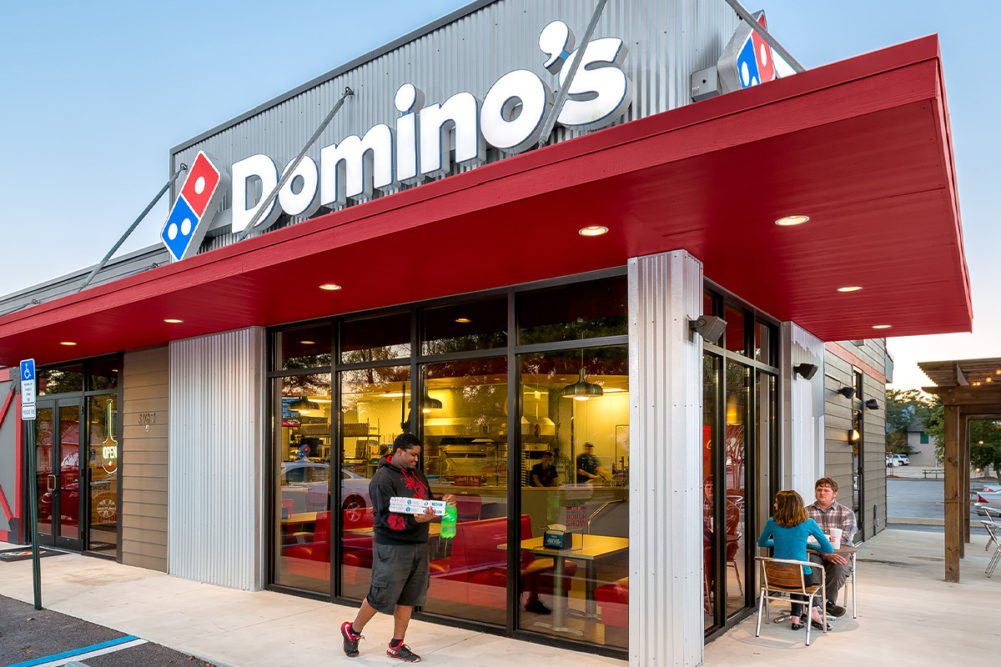ANN ARBOR, MICH. — “(Domino’s franchisees) delivered one out of every three pizzas before the pandemic, and they deliver about one out of every three pizzas post,” said Russell Weiner, chief executive officer of Domino’s Pizza Inc., during an Oct. 13 conference call to discuss third-quarter results.
“What is new and what they should be congratulated for is we’ve emerged now as the No. 1 carryout brand,” Weiner said. “And so, from a total pizza market share standpoint, we’re up 200 basis points versus three years ago, and that’s just an amazing accomplishment.”
Carryout same-store sales in the quarter were up almost 20% compared with the third quarter of 2021. Looking at the third quarter of 2019 as a basis, carryout sales increased 35% compared with the third quarter of 2019, the company said.
“As you know, while Domino’s started as a pizza delivery company, we began targeting the carryout segment with specific offers in 2011,” Weiner said. “That effort has paid off as NPD share data shows that we became the No. 1 carryout pizza brand in the US at the end of last year. We continued to grow the carryout business in the third quarter.”
Dominos’ net income for the third quarter ended Sept. 11 was $100.5 million, equal to $2.79 on the common stock, down from $120.4 million, or $3.24 per share, in the third quarter of 2021. The decrease was driven primarily by a higher provision for income taxes and lower income from operations. Provision for income taxes increased $16.9 million in the third quarter of 2022 due to a higher effective tax rate, which increased with excess tax benefits from equity-based compensation.
Investors showed enthusiasm the day Domino’s results were announced. The Ann Arbor-based company’s stock traded as high as $335.92 on the New York Stock Exchange on Oct. 13, jumping 11% from the previous day’s close of $301.76.
Quarterly sales reached $1.07 billion, up 7% from $998 million in the same period of the previous year.
Same-store sales in the United States were up 2% from the third quarter of 2021. Same-store sales were up almost 18% when compared with the third quarter of 2019.
In the first two quarters of 2022, Domino’s contended with a dearth of delivery drivers. Weiner said the company saw progress throughout the quarter resulting from its initiatives in this area. While Domino’s only has visibility to its corporate stores, the number of job applications and new hires has increased throughout the year, the company said.
“And at the end of the quarter, we were more or less back to 2019 levels as far as applications and new hires per week,” Weiner said. “Staffing remains a constraint, but my confidence in our ability to solve many of our delivery labor challenges ourselves has grown over the past few quarters. Our delivery service also showed improvement throughout the quarter. While we still have work to do to get back to our high standards for delivery service, I am encouraged by the progress we’ve made so far.”
Sandeep Reddy, chief financial officer, said the company continues to examine and evolve its pricing architecture.
“During the third quarter, the average price increase that was realized across our US system was 5.4%,” Reddy said. “We will adjust our carryout mix and match deal from $5.99 to $6.99 on Oct. 17. As a result of this update, we expect the realized pricing to increase to approximately 7% in the fourth quarter.”
Domino’s has been retooling efficiencies in its cost structure to ensure revenues consistently grow faster than expenses, Reddy said.
“We saw a sequential improvement in the year-over-year contraction of operating income margin as a percentage of revenues from 180 basis points in Q2 to 160 basis points in Q3. We need to continue this trend.”
The company realized a sequential improvement in US same-store sales from a drop of 2.9% in the second quarter to a gain of 2% in the third quarter, mostly driven by a smaller decline in order count.
“Excluding the negative impact of foreign currency, global retail sales grew almost 5% for the quarter, resulting in a three-year stack of plus 28% versus Q3 of 2019,” Weiner said. “We and our franchisees opened over 200 net new stores during the quarter and over 1,100 over the trailing four quarters.”
Subsequent to the end of the third quarter, Domino’s sold 114 company-owned stores in Arizona and Utah to franchisees for $41.1 million and it expects to record a gain on this transaction in the fourth quarter of 2022. The accounting for this transaction was still in process on Oct. 13.


